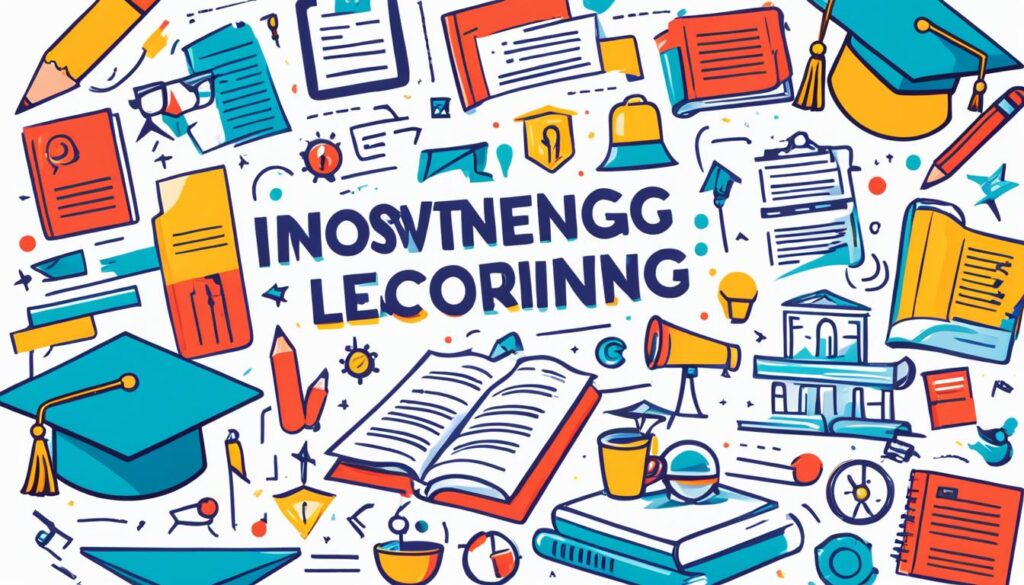Welcome to our guide on the power of continuing education and how it can shape and enhance your career journey. At [Company Name], we firmly believe that learning is a lifelong process, and investing in your professional development is crucial for staying ahead in today’s dynamic workplace.
Continuing education opportunities are diverse and encompass a wide range of options, including professional development courses, adult learning programs, online learning options, and career advancement workshops. These resources provide avenues for skill enhancement, knowledge expansion, and personal growth.
By engaging in continuing education, you can stay updated with industry trends, acquire new skills, and increase employability. The benefits of lifelong learning extend beyond personal and professional growth—they open doors to new career opportunities and pave the way for a fulfilling and successful future.
Key Takeaways:
- Continuing education offers a plethora of opportunities for skill enhancement and personal growth.
- Professional development courses, adult learning programs, and online learning options are just a few examples of the educational resources available.
- Investing in continuing education can increase employability and open doors to new career opportunities.
- By staying updated with industry trends, you can adapt to the evolving job market.
- Continuing education is an investment in your future and a catalyst for career progression.
The Need for Upskilling in a Technology-Driven Workplace
Technology is rapidly advancing, transforming the way we work and creating new opportunities in the job market. In this digital era, upskilling has become a necessity for individuals looking to thrive in a technology-driven workplace.
As the job market evolves, employers seek candidates with adaptable skills and digital literacy. The ability to stay updated with the latest technological advancements is crucial for remaining competitive and meeting the demands of today’s fast-paced business environment.
“The future of work will require individuals to continuously learn and adapt to technological advancements. By upskilling, professionals can future-proof their careers and unlock new opportunities.” – Industry expert
Digital literacy is now a core competency, regardless of industry or role. It encompasses the ability to effectively navigate digital tools, platforms, and information systems. By acquiring digital literacy, individuals can leverage technology to streamline workflows, improve productivity, and drive innovation within their organizations.
Adaptable skills, including critical thinking, problem-solving, and creativity, are also in high demand. These skills enable individuals to thrive in dynamic work environments, where technological advancements constantly reshape job requirements.
Investing in upskilling not only prepares individuals for the current job market but also equips them with the agility and foundation to adapt to future changes. By continuously expanding their skill set and staying abreast of emerging technologies, professionals can enhance their career prospects and remain relevant in an ever-evolving digital landscape.
In the next section, we will explore how continuing education serves as a catalyst for career progression, providing individuals with the necessary tools to thrive in the modern workplace.
Continuing Education as a Catalyst for Career Progression
Continuing education plays a vital role in driving career progression by fostering continuous learning and enabling individuals to acquire new skills and knowledge. Engaging in continuous learning and upskilling is key to enhancing professional growth, increasing employability, and unlocking new career opportunities.
As the business landscape rapidly evolves, professionals need to stay ahead of the curve to thrive in the competitive job market. Continuous learning allows individuals to adapt to the changing demands of their industry and acquire the skills necessary to excel in their chosen field. By actively seeking out opportunities for upskilling, professionals can expand their skill set and stay relevant in an ever-changing work environment.
Furthermore, continuous learning demonstrates a commitment to professional growth and development, which is highly valued by employers. According to a survey conducted by LinkedIn, 94% of employees would stay at a company longer if it invested in their career development. Employers are more likely to promote individuals who showcase a dedication to continuous learning and show the ability to adapt to new challenges.
Upskilling and acquiring new skills through continuing education can open doors to new career opportunities and help professionals take the next step in their career journey. By investing in continuous learning, individuals can position themselves for career advancement and explore new paths within their industry. Continuously acquiring new skills and knowledge prepares professionals for the challenges of the future.
“Continuous learning is the key to unlocking your potential and achieving sustained success in your career.”
Whether it is attending workshops, webinars, or pursuing advanced certifications, continuing education equips professionals with the tools and knowledge they need to stay competitive. By staying up-to-date with industry trends and developments, professionals can stay ahead of the competition and position themselves as valuable assets to their employers.
Continuing education is not limited to traditional learning environments. Online courses, webinars, and virtual workshops provide convenient and accessible options for professionals to continue their education while balancing work and personal commitments. These flexible learning opportunities allow individuals to acquire new skills at their own pace, creating a harmonious integration of learning and professional life.
As professionals embrace continuous learning, they embark on a journey of self-improvement and professional growth. It is the catalyst that propels careers forward, unlocking new possibilities and opening doors to a world of opportunities.

Building a Professional Network Through Lifelong Learning Programs
Lifelong learning programs offer a wealth of opportunities for personal and professional growth. In addition to acquiring new skills and knowledge, these programs also play a crucial role in building a strong professional network. By connecting with like-minded individuals and industry experts, you can expand your circle of influence, tap into valuable resources, and open doors to exciting career opportunities.
Benefits of Industry-Specific Training Opportunities
Industry-specific training programs are tailored to meet the unique needs and challenges of a particular field or profession. By participating in these programs, you can gain specialized knowledge, develop in-demand skills, and enhance your credibility within your industry. These targeted training opportunities not only equip you with the tools to excel in your current role but also position you as a valuable asset for future career advancement.
Networking at Educational Workshops and Seminars
Educational workshops and seminars provide a conducive environment for networking and forging valuable connections. By attending these events, you have the opportunity to interact with professionals from diverse backgrounds, exchange ideas, and collaborate on projects. Engaging in meaningful conversations and establishing rapport with industry leaders can greatly enhance your professional standing and open doors to new collaborations, mentorship opportunities, and career growth.
Overall, lifelong learning programs not only equip you with new skills and knowledge but also enable you to build a robust professional network. By capitalizing on industry-specific training opportunities and actively networking at educational workshops and seminars, you can enhance your career prospects, broaden your horizons, and stay at the forefront of your industry.
Continuing Education Opportunities
In today’s fast-paced and ever-changing world, continuing education has become more important than ever. It provides individuals with valuable opportunities to enhance their knowledge, skills, and expertise. Whether you’re looking to upskill for career advancement, acquire new certifications, or develop specialized skills, there are various continuing education options available to help you achieve your goals.
One popular avenue for continuing education is through online courses. Online courses offer the flexibility and convenience to learn at your own pace, from anywhere, and at any time. They cover a wide range of subjects and disciplines, making it easy to find a course that aligns with your interests and career aspirations. Online courses often include interactive content, discussions, and assessments to ensure a comprehensive learning experience.
Another valuable continuing education opportunity is workshops. Workshops provide hands-on training and practical knowledge in a specific area of expertise. They are often led by industry professionals and offer a collaborative learning environment. Workshops are a great way to enhance your skills and gain valuable insights from experienced professionals.
Certifications are also a popular choice for continuing education. They validate your expertise in a particular field and can enhance your professional credentials. Certifications demonstrate your commitment to ongoing learning and can offer a competitive edge in the job market. Many industries have specific certification programs available, allowing you to specialize and advance within your chosen field.
Skill development programs are another avenue for continuing education. These programs focus on enhancing specific skills that are in-demand in the job market. They can help you acquire new skills or improve existing ones, making you a more valuable asset to employers. These programs often include practical exercises, case studies, and real-world applications to ensure practical skill development.

Continuing education opportunities such as online courses, workshops, certifications, and skill development programs provide a valuable platform for personal and professional growth. By investing in continuing education, you can stay relevant in your industry, expand your knowledge and skills, and unlock new career opportunities. Whether you’re looking to advance your career, switch industries, or simply broaden your horizons, continuing education can be the key to achieving your goals.
How Online Learning Platforms Revolutionise Adult Learning
Online learning platforms have revolutionized adult learning by providing accessible and flexible learning options. These platforms offer a wide range of courses and educational resources that cater to the diverse needs of adult learners. Whether you’re looking to acquire new skills, enhance your knowledge in a specific field, or pursue personal interests, online learning platforms offer a convenient and self-paced learning experience.
One of the key advantages of online learning platforms is their accessibility. Unlike traditional classroom-based learning, online courses can be accessed from anywhere, at any time. This flexibility allows adult learners to fit their education around their busy schedules, making it easier to balance work, family, and other commitments.
Another major benefit of online learning platforms is the flexibility they offer in terms of learning pace. Self-paced courses enable adult learners to progress through the material at their own speed, ensuring a personalized learning experience. Whether you prefer to delve deep into a topic or skim through the essentials, online learning platforms can be tailored to suit your individual learning style and preferences.

Online learning platforms also provide a wealth of educational resources, including videos, interactive quizzes, and discussion forums, which facilitate engagement and interaction among learners. These platforms often feature expert instructors who are highly knowledgeable in their respective fields, ensuring that you receive quality education and guidance throughout your learning journey.
With online learning platforms at your disposal, you have the freedom to learn at your own pace, anywhere and anytime. Whether you’re looking to gain new skills for career advancement, explore personal interests, or simply expand your knowledge, these platforms offer a flexible and accessible avenue for adult learning.
Professional Development Courses: Expanding Skill Sets and Knowledge
Continuing education is essential for professionals looking to expand their skill sets and enhance their knowledge in specific areas. Professional development courses offer a valuable opportunity to acquire new skills and stay updated with the latest industry trends.

Embracing Career Advancement Workshops
Career advancement workshops provide a platform for individuals to enhance their skills, network with industry professionals, and gain valuable insights into their chosen field. These workshops offer a focused and intensive learning experience, allowing participants to delve deeper into specific topics and gain practical knowledge that can be immediately applied in their careers.
By actively participating in career advancement workshops, professionals can:
- Acquire new skills and knowledge relevant to their field
- Stay updated with industry best practices and emerging trends
- Expand their professional network by connecting with like-minded individuals and experts in their industry
- Gain recognition and improve their chances of career progression
Accessing Skill Enhancement Resources Online
With the advent of online learning platforms, accessing skill enhancement resources has become more accessible than ever before. These platforms offer a wide range of courses, webinars, and resources that cater to various professional needs and interests.
Some benefits of accessing skill enhancement resources online include:
- Flexibility: Professionals can learn at their own pace and schedule, fitting their learning around their work and personal commitments.
- Cost-effectiveness: Online resources often offer more affordable alternatives compared to traditional in-person courses.
- Diversity of topics: Online platforms provide a vast array of courses and resources covering a wide range of interests and industries.
- Accessibility: Professionals can access online resources from anywhere, eliminating geographical limitations.
By utilizing these online resources, professionals can continuously build and expand their skill sets, ensuring they stay competitive in today’s rapidly evolving job market.
Strategies to Successfully Integrate Learning into Your Career
Successfully integrating learning into your career requires effective strategies. By prioritizing continuous learning and skill development, you can stay ahead in your field and enhance your career prospects. In this section, we will discuss two key strategies to help you integrate learning seamlessly into your professional journey.
Creating a Personalised Learning Plan for Career Advancement
Creating a personalised learning plan is essential for maximizing the benefits of continuing education. Start by identifying your career goals and the specific skills you need to acquire or improve upon. Research available courses, workshops, or certifications that align with your objectives. With a personalised learning plan, you can focus on relevant areas and choose the most suitable learning opportunities.
Consider your learning style and preferences when developing your plan. Some individuals prefer self-paced online courses, while others thrive in interactive workshop settings. Tailor your learning plan to accommodate your learning style, ensuring an engaging and effective learning experience.
Regularly review and adjust your plan as you progress in your career. As new opportunities arise or industry trends shift, you may need to update your learning goals and adapt your plan accordingly. A personalised learning plan provides structure and direction, guiding you towards continuous growth and career advancement.
Finding Time for Lifelong Learning Seminars Amidst a Busy Schedule
Time management is crucial for carving out dedicated learning time in your busy schedule. Here are some strategies to help you find time for lifelong learning:
- Set Priorities: Evaluate your current commitments and identify activities that can be minimized or eliminated. Prioritize learning by allocating dedicated time slots and treating them as non-negotiable.
- Utilize Short Increments: Take advantage of short periods throughout the day, such as during your commute or lunch break, to engage in micro-learning. Use bite-sized resources, such as podcasts or articles, to maximize these brief moments of downtime.
- Create a Routine: Establish a consistent learning routine by scheduling specific days and times for focused learning sessions. By making learning a regular habit, it becomes easier to fit into your schedule.
- Embrace Technology: Leverage technology to enhance your learning experience. Online courses and webinars offer flexibility and accessibility, allowing you to learn from anywhere at any time.
- Delegate and Collaborate: Delegate tasks when possible and collaborate with colleagues to manage workload effectively. By sharing responsibilities, you can free up time for learning without compromising productivity.
With effective time management strategies and a commitment to lifelong learning, you can overcome the challenges of a busy schedule and make learning a priority in your career.
By creating a personalised learning plan and implementing time management strategies, you can successfully integrate learning into your career. These strategies will help you stay motivated, achieve your learning goals, and experience continuous growth and development throughout your professional journey.
Bridging Skill Gaps with Customised Corporate Training Programs
Bridging skill gaps in the workforce is crucial for organizational success. At our company, we understand the importance of continuous learning and upskilling employees to meet the ever-changing demands of the modern business landscape. That’s why we offer customized corporate training programs designed to address specific skill gaps and drive professional growth.
“Investing in customized training programs is an investment in the future of your organization.”
Our customized training programs are tailored to the unique needs of your team, ensuring that employees receive the specific knowledge and skills required to excel in their roles. Whether it’s technical expertise, leadership development, or industry-specific training, our programs are designed to bridge skill gaps and empower your workforce for success.
By investing in tailored training, you not only enhance the capabilities of your employees but also improve overall productivity and efficiency within your organization. With our customized corporate training programs, you can cultivate a skilled and agile workforce that is equipped to tackle challenges and drive innovation.
- Targeted skill development: Our programs focus on the specific areas where your team needs improvement, ensuring that valuable training resources are dedicated to bridging skill gaps.
- Increased employee engagement: By providing employees with opportunities for continuous learning and skill enhancement, you foster a culture of growth and development, resulting in higher engagement and job satisfaction.
- Improved retention and loyalty: When employees feel supported and invested in through training programs, they are more likely to stay with the organization, reducing turnover and attracting top talent.
- Enhanced adaptability: Customized training equips employees with the skills necessary to adapt to changing industry trends and technologies, ensuring your organization remains competitive and agile.
Investing in customized corporate training programs is an investment in the future of your organization. It demonstrates your commitment to employee development and positions your company as a leader in your industry.
Ready to bridge the skill gaps in your workforce and unlock their full potential? Contact us today to learn more about our customized corporate training programs!
Cultivating a Culture of Growth: Employers and Continuing Education
Employers play a vital role in fostering a growth culture within their organizations, and one effective way to achieve this is through investing in continuing education. By providing employees with opportunities for continuous learning and skill enhancement, employers create an environment that values personal and professional growth.
Mentorship and Its Role in Skill Enhancement
A key aspect of fostering growth within organizations is mentorship. Mentors play a crucial role in guiding and supporting employees as they develop new skills and enhance their expertise. By pairing experienced professionals with those who are seeking to grow, mentorship programs create a platform for knowledge sharing and skill development.
Through mentorship, employees can receive personalized guidance and feedback, allowing them to identify areas for improvement and develop strategies for skill enhancement. Mentors not only impart their knowledge and expertise but also serve as role models, inspiring and motivating their mentees to strive for continuous improvement.
Mentorship programs can be formal or informal, depending on the organization’s structure and goals. Formal mentorship programs may involve structured meetings, goal setting, and regular feedback sessions, while informal mentorship can occur through casual conversations and mentoring relationships that develop naturally within the workplace.
Why Recognizing Achievements Fuels Further Educational Pursuits
Recognizing employees’ achievements is another powerful tool for cultivating a culture of growth. When employers acknowledge and celebrate the accomplishments of their workforce, it not only boosts morale but also creates a sense of pride and motivation to pursue further educational opportunities.
Recognition can come in various forms, such as awards, promotions, or public acknowledgment of achievements. When employees feel valued and appreciated for their efforts, they are more likely to be proactive in seeking additional educational experiences and skill development opportunities.
Furthermore, employers can create incentives for employees to continue their education by offering financial support or time off to participate in training programs, conferences, or workshops. By investing in their employees’ educational pursuits, employers demonstrate a commitment to growth and provide tangible support that encourages individuals to further enhance their skills.
In summary, employers have a significant role to play in developing a culture of growth through continuing education. By promoting mentorship programs and recognizing employees’ achievements, employers create an environment that values skill enhancement and lifelong learning. This not only benefits individual employees but also contributes to the growth and success of the organization as a whole.
Mitigating the Challenges of Continuing Professional Training
Continuing professional training is an essential part of personal and career growth. However, it comes with its own set of challenges that individuals often face along the way. Overcoming these obstacles is crucial to successfully complete professional training and unlock new opportunities for advancement.
One of the major challenges of continuing professional training is finding the motivation to stay committed and dedicated to the learning journey. It can be challenging to balance work, personal life, and education, leading to feelings of overwhelm and exhaustion. To overcome this challenge, it is important to remind ourselves of the benefits and rewards that come with acquiring new skills and knowledge. Find your intrinsic motivation and establish clear goals to stay focused and committed.
Remember, every step you take towards continuing education brings you one step closer to your professional goals.
Support systems play a vital role in mitigating the challenges of continuing professional training. Surrounding yourself with like-minded individuals, mentors, and colleagues who support and encourage your learning journey can provide the necessary motivation and accountability. Seek out networking opportunities, join professional communities, and engage in peer-to-peer learning to establish a strong support system that keeps you motivated and inspired.
Another common challenge is navigating financial constraints. Professional training programs and courses can be costly, making it difficult for some individuals to access the education they need. However, there are various ways to overcome this challenge. Research scholarships, grants, and funding options that are available in your field. Look for affordable or free online courses and resources that provide quality education without breaking the bank. Remember, investing in your professional development is an investment in your future.
- Stay motivated and set clear goals
- Build a support system
- Explore funding options and affordable resources
With determination, motivation, and the right support systems in place, you can overcome the challenges of continuing professional training. Embrace the journey, stay focused on your goals, and unlock a world of possibilities for your career.
Overcoming Obstacles: Time Management and Financial Constraints
When it comes to pursuing continuing education, many individuals face two common obstacles: time management and financial constraints. However, with proper strategies and planning, these barriers can be overcome, allowing you to successfully balance work and learning while exploring affordable learning options.
Effective time management techniques play a crucial role in overcoming the challenge of balancing work and education. By prioritizing tasks, setting realistic goals, and creating a schedule that allows for dedicated learning time, you can optimize your productivity and make efficient use of your available time. It’s important to remember that small, consistent efforts can lead to significant progress in your educational journey.
“Time management is the key to unlocking the doors of educational growth amidst busy schedules. Embrace the power of organization and prioritize your learning goals to pave the way for success!”
Additionally, exploring affordable learning options can alleviate financial constraints. With the rise of online learning platforms and the availability of scholarships, grants, and low-cost courses, there are numerous opportunities to pursue continuing education without breaking the bank. These options not only provide flexibility but also allow you to acquire new knowledge and skills at a fraction of the cost of traditional education.
To illustrate how time management and financial constraints can be overcome, let’s take a closer look at some strategies:
| Time Management Techniques | Affordable Learning Options |
|---|---|
|
|
By implementing these strategies, you can overcome the obstacles of time management and financial constraints, making your continuing education journey more manageable and affordable. Remember, investing in your personal and professional development is an investment in your future success.
Conclusion
Throughout this article, we have explored the importance of continuing education in empowering career growth and fostering lifelong learning. Investing in your professional development journey can open doors to new opportunities, expand your skill set, and keep you updated with industry trends.
Continuing education offers a wide array of options, such as professional development courses, adult learning programs, online learning opportunities, and industry-specific training. By engaging in continuous learning and upskilling, you can enhance your professional growth and increase your employability in a rapidly evolving job market.
Moreover, lifelong learning programs not only contribute to personal and professional development but also facilitate the building of a strong professional network. Through educational workshops and seminars, you can strengthen your connections and create new career opportunities.
In conclusion, we encourage you to embrace continuing education as a catalyst for career progression. By investing in your skills and knowledge, you will be equipped to thrive in a technology-driven workplace, bridge skill gaps, and cultivate a culture of growth. Embrace the journey of lifelong learning and empower yourself to reach new heights in your career.
FAQ
What are some continuing education opportunities available to individuals?
There are various continuing education opportunities available, including professional development courses, adult learning programs, online learning options, and more.
Why is upskilling important in a technology-driven workplace?
In a technology-driven workplace, upskilling is important to keep up with the evolving job market, improve digital literacy, and possess adaptable skills.
How does continuing education contribute to career progression?
Continuing education enables individuals to continuously learn, acquire new skills, and enhance their professional growth, increasing their employability and opening doors to new career opportunities.
What are the benefits of industry-specific training opportunities?
Industry-specific training opportunities provide targeted learning experiences and help individuals build a strong professional network, opening doors to new career opportunities.
How can online learning platforms revolutionize adult learning?
Online learning platforms offer accessibility and flexibility, allowing adults to learn at their own pace and convenience, transforming the way they acquire knowledge and skills.
How do professional development courses expand skill sets and knowledge?
Professional development courses are designed to enhance skills and knowledge in specific areas, contributing to career advancement and opening doors to new opportunities.
What strategies can help integrate learning into a career?
Effective strategies for integrating learning into a career include creating a personalized learning plan for career advancement and finding time for lifelong learning seminars amidst a busy schedule.
How do customised corporate training programs bridge skill gaps?
Customised corporate training programs upskill employees, fill skill gaps, and improve overall productivity and efficiency in the workforce.
How do employers contribute to continuing education?
Employers cultivate a culture of growth by providing mentorship programs for skill enhancement and recognizing achievements, which fuels further educational pursuits.
What challenges are faced during continuing professional training?
Common challenges during continuing professional training include time management and financial constraints. Finding motivation and having support systems in place are crucial for successful completion of training.
How can time management and financial constraints be overcome?
Time management techniques can help overcome the challenge of balancing work and learning. Exploring affordable learning options can also help mitigate financial constraints.
Source Links
- https://professional.dce.harvard.edu/blog/why-is-professional-development-important/
- https://www.linkedin.com/pulse/empowering-growth-power-continuous-learning-todays-shabaani-msc-ce-
- https://cce.sydney.edu.au/

